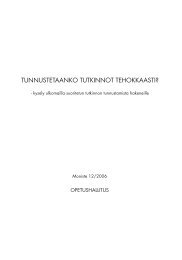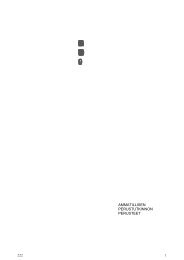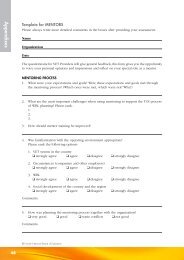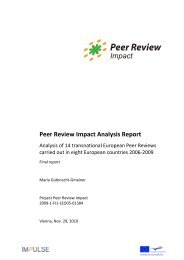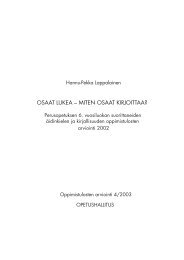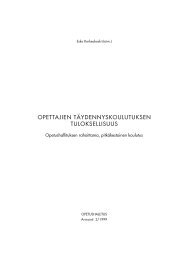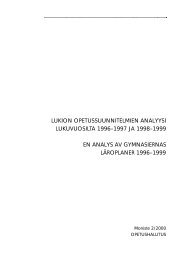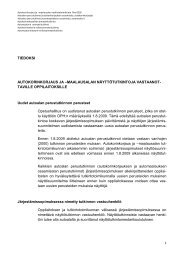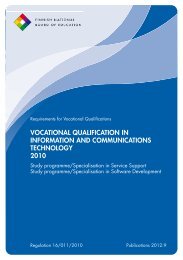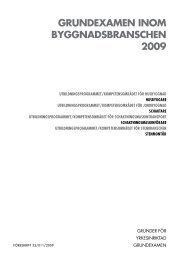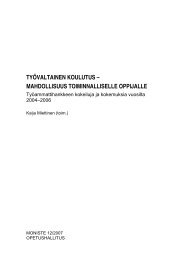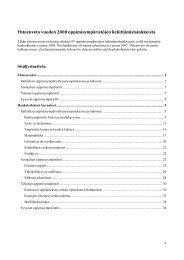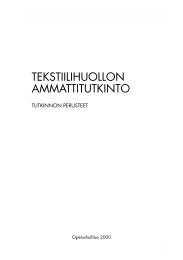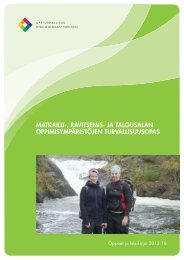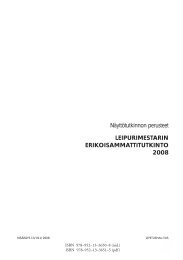School Library A Good
School Library A Good
School Library A Good
Create successful ePaper yourself
Turn your PDF publications into a flip-book with our unique Google optimized e-Paper software.
The sky<br />
is the<br />
limit<br />
<strong>School</strong> curriculum<br />
The national core curriculum is the basis for the goals of the<br />
school library activities. Among the things mentioned in the<br />
national core curriculum are interest in the surrounding world,<br />
curious information retrieval, independent work, creative<br />
problem solving, awakening one’s own reading for pleasure<br />
and lifelong learning skills. The school’s own curriculum<br />
further defines the school library activities making each school<br />
library unique. It is recommended that the goals and activities<br />
of the school library be written in the curriculum and possibly<br />
also the teaching requiring use of the school library especially<br />
(e.g. story time for 1st and 2nd grade pupils, material<br />
management course for the 3rd and 4th grade pupils,<br />
information retrieval course for the 5th and 6th grade pupils,<br />
an essay course for the 8th grade pupils, environmental<br />
protection course for upper secondary education students).<br />
In planning the curriculum the following issues, among others,<br />
are related to the school library<br />
• taking pupil groups of different type into consideration<br />
(age, language and culture, special needs education, club<br />
activities, afternoon club activities)<br />
• development of teaching methods (cooperative learning,<br />
explorative learning methods, etc.)<br />
• goals set for the use of the school library by individual<br />
subjects<br />
• information management skills at different grades, cf. the<br />
school information strategy<br />
• school library as a part of literature teaching<br />
• visibility of the school’s area of focus<br />
• school library supporting the language programme of the<br />
school<br />
• school library supporting individual learning or flexible<br />
teaching arrangements<br />
• collaboration with parents, the public library or other groups<br />
affiliated with it<br />
<strong>School</strong>’s action plan<br />
The annual school action plan contains definitions of the<br />
school year’s activities in more detail. Special school library<br />
campaigns can be included in the action plan (Reading Week,<br />
Day of the Book and the Rose, Nordic <strong>Library</strong> Week,<br />
International <strong>School</strong> <strong>Library</strong> Day, The Kalevala, Runeberg,<br />
Lö'9annrot, Agricola, Topelius, Aleksis Kivi, Favourite Book<br />
Day, etc.). A school may have a library club which organises<br />
events in the school library, or a literature club using the<br />
school library premises as their meeting place. Some years<br />
a particular theme may be emphasised, whose visibility in the<br />
school library is significant.<br />
<strong>School</strong> budget<br />
– school library,<br />
culture for all<br />
<strong>School</strong>s have a great deal of autonomy when it comes to<br />
deciding over their finances. Maintaining and developing the<br />
school library requires an annual budget that is for the library<br />
only. For this reason the role of the headmaster is especially<br />
important in developing the school library. The school library<br />
material is teaching material at its best and requires<br />
cooperation between all the pupils and teachers in order to<br />
A <strong>Good</strong> <strong>School</strong> <strong>Library</strong>



